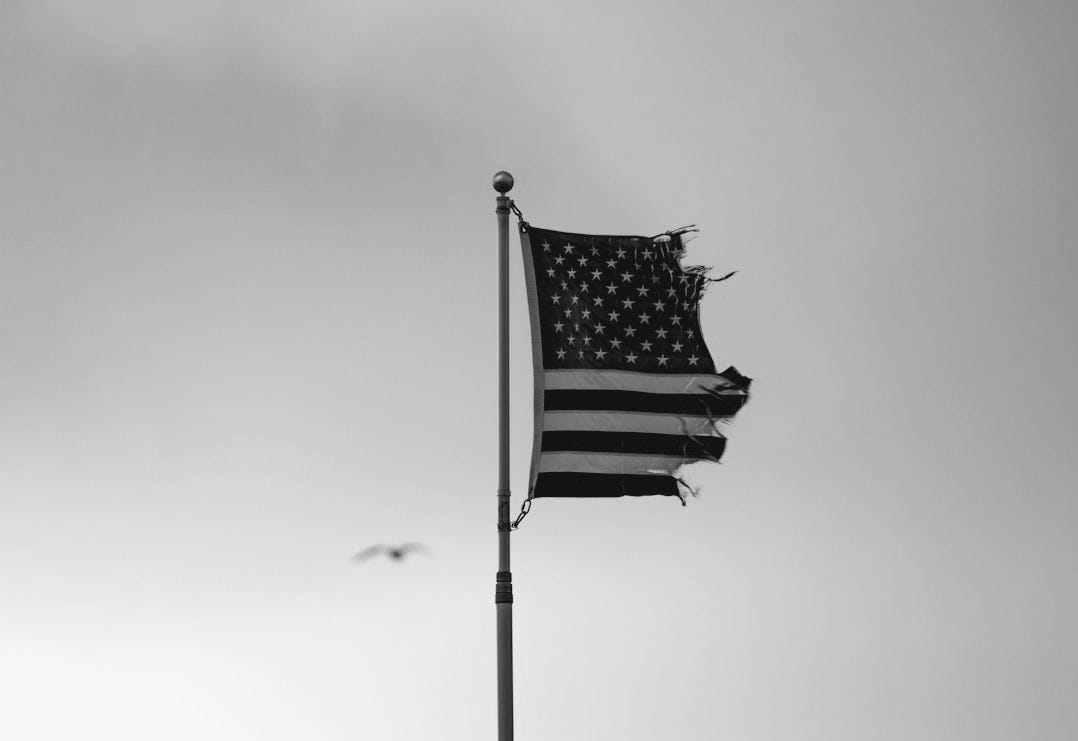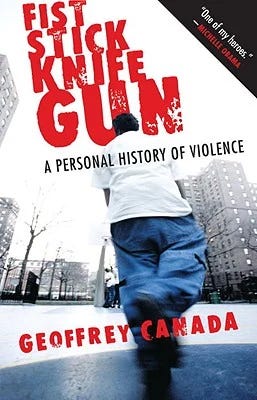The Killing Machines Are Destroying Us
... and only we can save ourselves
He said that it was “worth it” to have “some gun deaths every single year, so that we can have the second amendment.”1
In a twist that almost seems made-up, he was literally talking to a crowd of thousands about gun violence in America at the very moment he was shot and killed by a rifle.
By his own standards, his death was a necessary sacrifice.
But I don’t agree.
I don’t think he should have died by killing machine.
I hold his humanity and his life as sacred — more sacred than he held the lives of the countless individuals and groups he vociferously de-humanized, on the regular.
I hold every. single. human. life. sacred.
And thus, I’m flummoxed.
I’m disoriented.
I’m aching.
I’m full of grief and questions.
Like these:
How have we let killing machines numb us to the inherent dignity and beauty of life, so much so that we’d choose preserving those killing machines over preserving human lives, time and time again?
How can we love killing machines more than our fellow humans?
How have we let violence become one of the primary ways we relate to each other in this country — whether through insults, hatred, bigotry, raised voices, fists, sticks, knives, or guns — while we keep pretending that the United States is a beacon of peace, freedom, justice, and the pursuit of happiness?
We are not at peace.
We are not free.
We do not have justice.
And we are not happy.
The killing machines have killed all of those things.

The Mundanity of Our Violence
Our violence isn’t always big.
Lots of times, it’s a relatively “mundane” incident, on neighborhood streets… or in homes… or at workplaces… or in airplanes or buses.
Most of the incidents will never be known beyond the two, or a few, people who were involved in them. Certainly, they won’t get news headlines.
This one showed up on a nearby neighborhood’s message board today:
An enraged man attacked my car yesterday while I was inside of it.
I was returning from the library at 10:30AM. At an intersection, I stopped to let a man walking a large, tan-colored dog cross.
He got to the other side of the road as I moved slowly through the intersection… but then he stopped, turned around, and walked toward my small car, getting in front of it and yelling at me.
I rolled down my window and said “Sorry,” realizing that he probably thought I hadn’t given him enough space. While I repeated “Sorry,” he slammed his fist onto the hood of my car. Then, in a flash, he was beside my window, still yelling.
I managed to close it, which was fortunate, because I think he would have reached in and punched me. Instead, he wound up and, using his fist, struck my window as hard as he could. I was terrified it would break, but it held.
I moved past the intersection and then paused, shaken, and looked back. What had just happened? Back home, I examined the smear marks his fist had created on my window and discovered a baseball-sized dent in the hood of my car.
Anger is normal.
Anger is human.
But so many of us seem not to have learned the essential lessons of healthy emotional regulation yet.
This is essentially an inter-generational trauma. We didn’t learn this… because our parents didn’t learn this… and they didn’t learn this because their parents didn’t learn it… and so on and so on.
People who don’t know how to live healthily with their emotions have no idea how to help other people live healthily with their emotions…
… and so it goes.
How Emotions Take On Too Much Power
Here’s some of what we’re missing…
Anger is an emotion, yes.
And anger has no business becoming an action.
Emotions, in a healthy human, are meant to be related to like weather.
Just like the clouds, or storms, or heat, or cold do… we can watch emotions approach us like a front… pause for a bit while they fill the air around us, and we experience them… and then they move on.
Healthy, mature adults do this.
Most of the adults around us don’t.
Collectively, we’re letting our emotions run amok.
And they’re creating a mundanity of violence in our culture that we have all started to become so inured to that we often don’t even see it.
We’ve learned to think of all of this as “normal.”
We don’t know how to relate to emotions appropriately — as the constantly changing winds that they are, rather than as life-consuming, life-altering plagues.
We don’t know how to work through conflict constructively.
We don’t know how to hold each other accountable without violence and/or revenge. We think accountability… is revenge… and thus, we have no concept of accountability grounded in love.
Yet…
How many spiritual teachers have walked the planet, begging us to stop seeing “an eye for an eye” as the way to approach our differences… and yet we just keep behaving as though that’s the only home training we’ve ever known?
How many of them have preached to love other humans as ourselves?
How many have taught us how transient this human life is — that the only constant is change, and that the more we cling to things rather than holding it all lightly, the more we’ll make ourselves, and others, suffer?
This is as true of emotions as it is of anything else in these fragile lives of ours.
But yet, we’re letting an emotion be a final word on someone’s life.
And the killing machines are what’s making this possible.
They make killing someone quicker, easier, more hands-off and at-arms-length-or-more, and even theoretical than it has ever been in human history.
They sanitize killing.
They’re built for that.
Fist Stick Knife Gun
I remember when I was graduating from college and preparing to start teaching at an alternative high school in inner city Milwaukee.
My friend handed me this book:
She thought I’d appreciate it, as I prepared for my coming year.
I did.
Decades later now, I don’t remember all of the specifics — but I do remember the distinct way it framed the escalation of violence on the streets of the South Bronx, where Geoffrey Canada (of Harlem Children’s Zone and Waiting for Superman fame) grew from a boy into a man.
I remember him describing how, even amidst the endemic violence in the streets, there was always a “code” that everyone knew to follow — whether the violence was with mere fists… or it had progressed to sticks… or knives.
There was a “safety” in the shared agreements.
There were established power hierarchies.
People respected them, because they had to.
And then, when guns came onto the scene…
… all bets were off.
Suddenly, any old person could hold, in their hand, the ultimate power: to quickly, easily end the life of any other person.
This meant chaos reigned.
This meant deaths increased.
Because beyond living in a community weighed down by poverty and structural racism, the bonds of community were now being ripped apart…
… by machines whose pure purpose was to kill each other.
Domination Isn’t What Actually Wins
Domination destroys us all.
Our American culture has led us to believe that bigger, louder, stronger, more violent, more armed-to-the-teeth signals power…
…because enough of us are confused about what power really is…
… and about the ways to live our lives well.
Meanwhile…
We wrongly marginalize feminine energy (like care, compassion, empathy, love) in our field of nonprofits/philanthropy — a field that is supposed to be all about those things, by the way.
We need what I’m saying and writing here.
We need this — unless we want to completely destroy ourselves.
We are all human. We are all human… together.
We are made to live together in community — a community that is peaceful, supportive, just, equitable, compassionate, joyful, hopeful, caring, loving.
We can be angry with each other, and we will be.
But we shouldn’t have access to killing machines when we are.
We can disagree, and we will.
But we shouldn’t have access to killing machines when we do.
We can struggle through mental illness and suicidality, and far too many of us will haves these struggles.
But we shouldn’t have access to killing machines when we are.
The time for the nightmare to end is now.
The time to acknowledge the truth is now.
Love wins.
Every time.
So let’s start prioritizing it.
Let’s stop acting like facsimiles of human beings so caught up in a fictional story that we’ve decided to trade away all of our humanity, in order to keep the killing machines that promise us unearned, unnatural power and convince us that we don’t need to choose and reaffirm the dignity and beauty of each of our fellow humans far more.
Let’s start living with love and care and our shared humanity among us.
Finally.
For the Love of Humanity is an online community made up of, and generously supported by, its readers and listeners (like you).
Your support — whether through a Supporting Subscription, or through leaving a “heart” or a comment on posts, or by sharing published pieces, or simply by bringing your presence here and helping to grow this community — is so appreciated.
Find For the Love of Humanity elsewhere and join us there too!
➡️ LinkedIn | Facebook | Instagram | Threads | BlueSky ⬅️
https://www.theguardian.com/us-news/2025/sep/11/charlie-kirk-quotes-beliefs




Foucault would remind us that the gun is by no means the only ‘killing machine’ we have created.